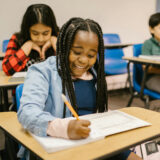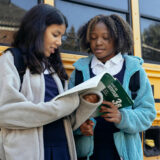Curriculum Programs

The curriculum materials selected for students of AMA are designed to help meet state common core standards and address the different learning styles of our students. The materials selected vary from computer programs to textbooks of the four core curriculum subjects. The curriculum materials are structured with learning management systems, digital interactive components, and assessments. The assignments for students can be customized for all core areas. The assessment components are also aligned to local, state and national assessments.
- Savaas
- Reading A-Z
- Study Island
- Moby Max
- iXL
- Pearson
Therapeutic Services

AMA has professional therapists to support and improve students’ academic, mental health and wellness of all students. The therapeutic services are designed to help increase attendance, build coping character skills, and promote academic achievement and to expand student’s horizon on life.
- Group Circle Therapy Session
- Mental Health Therapy
- Individual Session
- Counseling Session
- ABA Therapy
- Occupational Therapy
- Contingency Behavior Motivation Program
- Art Therapy
- Music Therapy
Positive Behavioral Interventions and Supports (PBIS) at Academic Mastery Academy
Behavioral challenges in educational settings are multifaceted and present in varying degrees across schools nationwide. These challenges are often more pronounced in students with high-incidence disabilities. Behavior can be understood across several dimensions, including topography (the observable form of the behavior), frequency, rate, celeration (rate of change in behavior over time), duration, inter-response time, and latency. These dimensions help educators assess not only what the behavior looks like but also how often, how long, and under what circumstances it occurs.
As educators, it is our responsibility to cultivate a safe and supportive learning environment for all students. Unaddressed interfering behaviors can significantly hinder a student’s access to educational opportunities, inclusion, and meaningful social and community engagement. In more severe cases, such behaviors can lead to injury, limit peer relationships, and result in negative interactions with adults. Research has shown that persistent behavioral challenges often correlate with poor academic trajectories, diminished social development, and compromised school safety.
Speech and /Language Impairment Program

Designed for students with the following:
- Articulation disorders such as omissions, substitutions and distortions.
- Fluency disorders may include hesitations, repetitions, or prolongations of sounds and syllables, word or phases.
- Voice disorders may include the quality or use of one’s voice; possible abnormal production and/ or absence of voice quality, pitch, loudness, resonance, and/or duration.
Autism Program

Designed for students who have neurodevelopment disorder that causes difficulties with social interaction and communication with restricted and repetitive behavior.
Learning Disability

Disability Programs K-8
The Learning Disability Program is designed to address the academic needs of the student who is performing significantly below grade level. Through the collection of data, an individualized learning plan is developed; in addition, the program utilizes a sequential and multisensory approach designed around student learning needs.
Developmental Delayed Program

The Developmental Delayed Program is for students who are delayed in one or more of the following domains which interferes in the learning process:
-
- Physical development (fine and gross motor skills)
- Cognitive development (intellectual abilities)
- Communication (speech and language)
- Social or emotional development (social-emotional skills emotional control)
- Adaptive development (self-care skills)
Emotional Disability

Emotional/Behavioral Disability is a program designed to provide students with a format for learning the social skills of self-awareness, self-management, social awareness, relationship skills and decision-making. The program drives and empowers students to seek healthy and positive relationships with their family, friends, and their community. As a result, students will become a positive contributor to society.
Intellectual Disability

The Intellectual Disability program is designed for students with limitations in mental functioning and in skills such as communication, social skills, and taking care of themselves. The student may be cognitively delayed and learn slower.
Specific Learning Disability

Learning Disability
The Learning Disability program is designed to address the academic needs of the student who is performing significantly below grade level. Through the collection of data, an individualized learning plan is developed. In addition, the program utilizes a sequential and multisensory approach designed around student learning needs.
